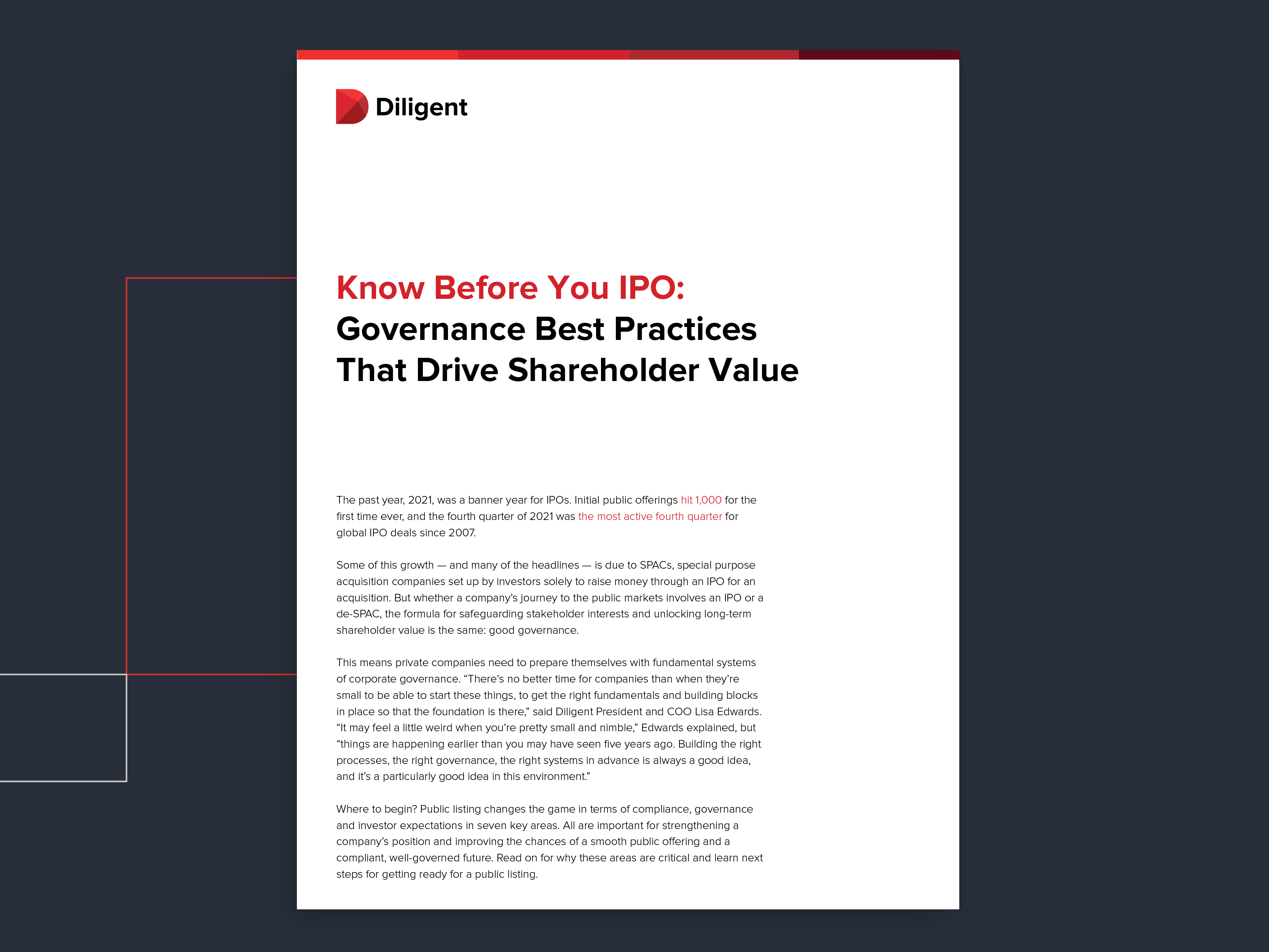The buildup to going public always seems exciting, though it might be fraught with uncertainties on the way. Regardless, when a company decides to go public, leadership will always want to position the company to meet regulatory standards in advance of its initial public offering (IPO). The bottom line: If there's a desire to take the company public, the company must demonstrably establish a fundamental system of corporate governance that serves to safeguard shareholders' and overall stakeholders' interests.
Getting the fundamentals right includes setting up your accounting systems correctly, establishing a proper audit structure and designing executive compensation. During our recent Modern Governance Summit session ''Planning for the Future IPO: The Importance of Getting Governance Right from the Start,'' our panelists offered key insights for companies hoping to IPO:
Getting the fundamentals right includes setting up your accounting systems correctly, establishing a proper audit structure and designing executive compensation. During our recent Modern Governance Summit session ''Planning for the Future IPO: The Importance of Getting Governance Right from the Start,'' our panelists offered key insights for companies hoping to IPO:
Get the Board Right
One of the fundamentals that needs to be in place during the pre-IPO stage is the right mixture of independence, expertise and diversity. One of the mistakes that newly public companies make is forming a board with their senior executives, which creates familiarity and hampers independence. While a private company's board is not likely to have independent non-executive directors (NEDs), a company looking to IPO must strive to have NEDs who meet their respective regulatory bodies' independence standards. The board must also be skilled, and membership should reflect diversity in tenure, age and gender. When a company goes public, it faces increased scrutiny from investors. The company needs to hire non-executive directors with the right exposure to the demands of investors and who understand the investment landscape.Ensure Audit and Compensation Committees' Independence
Even before an IPO, companies need to ensure that their committees are completely independent to provide proper oversight. A company preparing for an IPO must understand that it will have to design a sound compensation framework that rewards sustainable value creation. The compensation policy must also reflect the company's philosophy and objectives. Hence it becomes necessary to form a committee that has independence and understands the rudiments of compensation practices. In many jurisdictions, the corporate governance code states clearly that the compensation committee must be 100% independent, and pre-IPO companies must strive to meet this. Similarly, a pre-IPO company must also strive to have an audit committee that is fully independent and have at least one financial literate in line with corporate governance standards, such as the UK Corporate Governance Code for companies listed on the LSE or the Canadian Corporate Governance Code for companies listed on the TSX.Get Your ESG disclosure Right
The regulatory landscape is rapidly changing and regulatory bodies such as the Securities and Exchange Commission (SEC) are beginning to mandate that companies disclose their policies on climate change and diversity targets. Getting these reporting standards right is critical. Most investors are now looking closely to see whether issuers are doing a level of sustainability reporting.''Many investors expect public companies to publish sustainability reports or corporate social responsibility reports, and so it's important for companies getting ready to be public and be ready to have to do those kinds of things and get the financial reporting team involved too. Financial reporting is a huge part of the proper preparation for becoming a public company and you need to start thinking about sort of those E & S metrics as well and think about them and really the same terms as you're thinking about the financial reporting'' Allison Handy, Partner and Co-Chair of Corporate & Securities Practice, Perkins Coie LLPThinking about an IPO? Make sure you have the right governance practices in place. Download our free Pre-IPO checklist today.




